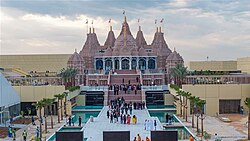Hinduism in the United Arab Emirates
 Visitors at newly constructed BAPS Hindu Mandir at Abu Dhabi. | |
| Total population | |
|---|---|
| 1,239,600 (2022) | |
| Regions with significant populations | |
| Abu Dhabi, Dubai, and Sharjah | |
| Religions | |
| Hinduism | |
| Related ethnic groups | |
| Indians in the United Arab Emirates |
Hindus are the third largest Religious group in the United Arab Emirates and constitute around 6.6%-15% of the population in the nation.[1] Hinduism is followed mainly by the significant Nepali and Indian population in the United Arab Emirates.[2]
History
[edit]At the turn of the 20th century, the region that now comprises the UAE experienced an economic boom as a result of the pearling industry; the few Indian traders who immigrated to the emirates settled in coastal towns and remained on the fringes of Emirati society.[3] Dubai has traditionally served as an "entrepôt for trade between the Middle East and the Indian subcontinent and was dominated by Hindu merchants in both gold and textile trade".[4] After the discovery of crude oil and large-scale industrialization and urbanization in the UAE, many workers and employees came to UAE for employment purposes in the nation.[5] Many South Asians immigrated there for work, and after 2000, Dubai became a global hotspot, attracting mainly South Asians, many of whom were Hindus.[6]
Demographics
[edit]Most of the Hindu diaspora in UAE are Indian, especially from Tamil Nadu, Karnataka, Uttar Pradesh, Kerala, Maharashtra, and Punjab.[7] The other Hindus are from Nepal, Pakistan, Bangladesh, Sri Lanka, and Bhutan.[8][9][10]
According to the 2007 International Religious Freedom Report, unofficial figures estimate that at least 15 percent of the UAE population is Hindu.[11] In 2011, the Pew Research Center estimates that Hindus constitute 6.6% of the population.[12]
Temples
[edit]
There are currently two temples in Dubai and one temple in Abu Dhabi.
- Hindu Temple, Dubai (1958)
- Hindu Temple Jebel Ali, Dubai (2022)
- BAPS Hindu Mandir Abu Dhabi (2024)
The Hindu Temple, Dubai, located in Bur Dubai, is locally referred to as "Shiva and Krishna Mandir." It was built in 1958.[13] The Shiv temple closed in 2024 due to lack of space and was relocated to Jebel Ali. The Krishna Temple continues to exist there.
The second Hindu Temple of Dubai is in Jebel Ali Village next to the Sikh Gurudwara and Churches Complex. The temple was opened on October 5, 2022.
In August 2015, the UAE government allocated land for the construction of a Hindu temple in Abu Dhabi. The construction of the BAPS Hindu Mandir in Abu Dhabi commenced in December 2019.[14] Indian Prime Minister Narendra Modi inaugurated the temple on 14 February 2024.[15]
In addition to temples, there are community centers where Hindus can gather for prayer, religious ceremonies, and cultural activities.[16]
Cremation facilities for Hindus
[edit]There are two operating cremation facilities for the Hindu community, one in Abu Dhabi and one in Dubai.[17]
See also
[edit]References
[edit]Citations
[edit]- ^ "United Arab Emirates". U.S. Department of State. Retrieved 24 May 2021.
- ^ Ahuja, Akshay (27 April 2023). "Determinants of cardiovascular diseases among Indian expatriates residing in Ajman, UAE-A Pilot study". Population Medicine. 5 (Supplement). doi:10.18332/popmed/165582. ISSN 2654-1459.
- ^ Abed, Hellyer. United Arab Emirates: A New Perspective (page 114). Trident Press. 2001
- ^ King, Russel. Return Migration and Regional Economic Problems (page 245). Routledge. 1986
- ^ Marsh 2015, p. 67.
- ^ Marsh 2015, p. 71.
- ^ Said, Luxrai27; October 29, on; Pm, 2015 at 6:18 (22 March 2009). "The Hindu Diaspora In The Middle East". Kashmir Blogs. Retrieved 24 May 2021.
{{cite web}}: CS1 maint: numeric names: authors list (link) - ^ "Centre's intervention sought to help Indians stranded in Nepal". The Hindu. 28 April 2021. ISSN 0971-751X. Retrieved 12 July 2021.
- ^ "Did you know 250,000 Sri Lankans live in the UAE?". gulfnews.com. Retrieved 12 July 2021.
- ^ "Hindu temples in the UAE: A symbol of tolerance". Maktoob Yahoo. Retrieved 12 July 2021.
- ^ "United Arab Emirates: International Religious Freedom Report 2007". United States Department of State: Bureau of Democracy, Human Rights, and Labor. 14 September 2007. Retrieved 1 April 2023.
- ^ "2021 Report on International Religious Freedom: United Arab Emirates". United States Department of State: Bureau of Democracy, Human Rights, and Labor. Retrieved 1 April 2023.
- ^ "First Hindu temple in Abu Dhabi: 8 things you may want to know". Condé Nast Traveller India. 3 April 2019. Retrieved 24 May 2021.
- ^ Kumar, Ashwani. "'Dream come true': 30 days left for Abu Dhabi Hindu temple grand opening". Khaleej Times. Retrieved 14 February 2024.
- ^ "PM Modi performs Aarti at the BAPS Mandir, the first Hindu temple in Abu Dhabi". The Economic Times. 14 February 2024.
- ^ Divya, Vaid; Ankur, Datta (27 June 2019), "Caste and Contemporary Hindu Society", The Oxford History of Hinduism: Modern Hinduism, Oxford University Press, pp. 216–243, ISBN 978-0-19-879083-9, retrieved 3 September 2024
- ^ Kumar, Ashwani. "Look: Abu Dhabi Hindu temple rising 'at great pace'". Khaleej Times. Retrieved 24 May 2021.
Bibliography
[edit]- Marsh, Donna (2015). Doing Business in the Middle East. Brown Book Group. ISBN 9781472135674.
External links
[edit]- United Arab Emirates 2017 International Religious Freedom Report Archived 12 April 2022 at the Wayback Machine (PDF)
